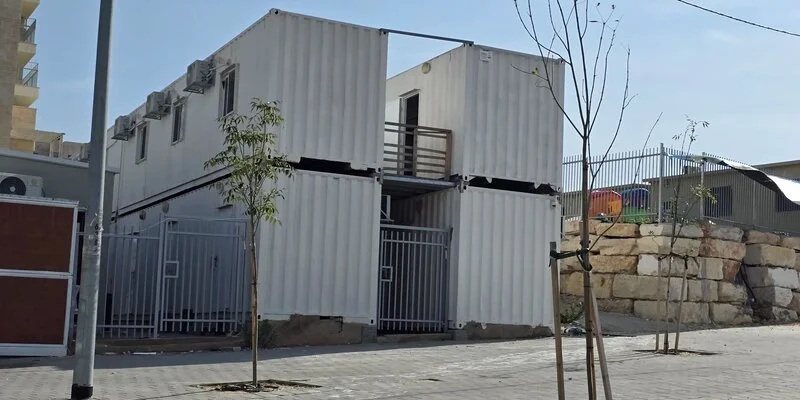The illegal garbage plaguing Israel’s moshavim: “It’s crazy how they’re contaminating our land”
Residents of the Jerusalem Hills can hardly believe their eyes when they see how their streams and agricultural lands are being flooded by a combination of construction waste and filthy soil from building sites. Anyone who dares to complain is met with a violent response and the fines imposed on contractors are a drop in the ocean. Even the Environmental Protection Ministry admits that it’s helpless. “It’s like the destruction of the Temple,” says Itzik, a resident of Kfar Uria, as he points to a huge mound of dirt that is blocking the flow of a stream – and under which has been buried polluting construction material. “It’s like the Wild West here,” says moshavnik Tal.
.jpg)
.jpg)
Residents of the Jerusalem Hills can hardly believe their eyes when they see how their streams and agricultural lands are being flooded by a combination of construction waste and filthy soil from building sites. Anyone who dares to complain is met with a violent response and the fines imposed on contractors are a drop in the ocean. Even the Environmental Protection Ministry admits that it’s helpless. “It’s like the destruction of the Temple,” says Itzik, a resident of Kfar Uria, as he points to a huge mound of dirt that is blocking the flow of a stream – and under which has been buried polluting construction material. “It’s like the Wild West here,” says moshavnik Tal.
.jpg)
Residents of the Jerusalem Hills can hardly believe their eyes when they see how their streams and agricultural lands are being flooded by a combination of construction waste and filthy soil from building sites. Anyone who dares to complain is met with a violent response and the fines imposed on contractors are a drop in the ocean. Even the Environmental Protection Ministry admits that it’s helpless. “It’s like the destruction of the Temple,” says Itzik, a resident of Kfar Uria, as he points to a huge mound of dirt that is blocking the flow of a stream – and under which has been buried polluting construction material. “It’s like the Wild West here,” says moshavnik Tal.
Photo: Bea Bar Kallos

Daniel Dolev
January 11, 2022
Summary


Listen to a Dynamic Summary of the Article
Created using NotebookLM AI tool
Alongside the fruit trees, the vineyards and the greenhouses that are dotted around the agricultural lands near the Harel Stream, close to Beit Shemesh, recent years have seen the proliferation of a very different kind of growth: huge mounds of dirt. The economic reality, coupled with the state’s helplessness, have turned disposal of this dirt into a very profitable business. But there is a heavy price to be paid – in terms of the view, the environment and the general public.
The most serious and obvious manifestation of this phenomenon on the ground is the dumping of construction material: huge white mounds of broken concrete walls, iron and, on occasion, hazardous material such as asbestos. Apart from construction waste, it’s easy to see the dirt phenomenon in action. Contractors pay local landowners to let them dump excess dirt from their projects. According to activists, payments can vary from 100 shekels to 300 shekels per truck – and the larger projects can fill hundreds or even thousands of trucks.
“It’s like the Wild West here,” says Tal, a local moshavnik. “The local authority doesn’t conduct inspections for various reasons, and there’s no clarity as to what’s legal and what’s not. Every landowner decides for himself what he wants to do and it’s down to each one’s conscience. Those who are moral, don’t do it at all, or do it properly; those whose conscience doesn’t bother them do whatever the hell they like. Until about a year ago, the phenomenon was confined to within private land, but now mounds of dirt are springing up everywhere. They’ve cut down thousands of trees for it. And you can see how it’s damaged the pristine view. The streams are suffering. It’s been taken over by rampant crime; there were even cases of criminals dumping waste on an old lady’s property. They dug a hole, dumped their garbage and covered it over. The poor woman doesn’t know what to do.”
Lizy Delaricha, the deputy head of the Union of Local Authorities and head of the Ganei Tikva Regional Council, says that “on the national level, I think this phenomenon exists wherever there are open spaces. Contractors will always look to reduce the cost of removing waste material, because transporting and buying waste is very expensive. I am certain that in more distant areas and where there are more open spaces, it happens even more.”
Delaricha is only too familiar with the phenomena of pirate dumping of construction waste – even in the community where she is council leader. “We also have open areas and privately owned agricultural land in our municipal region,” she explains. “We get a lot of reports in real time from farmers whose lands overlook the open areas about pirate dumping. We also put a camera in one area close to us and we got complaints about illegal dumping there, too. It’s a national blight. The whole subject is unregulated and I cannot say with any certainty that there’s a nationwide solution to the problem.”













